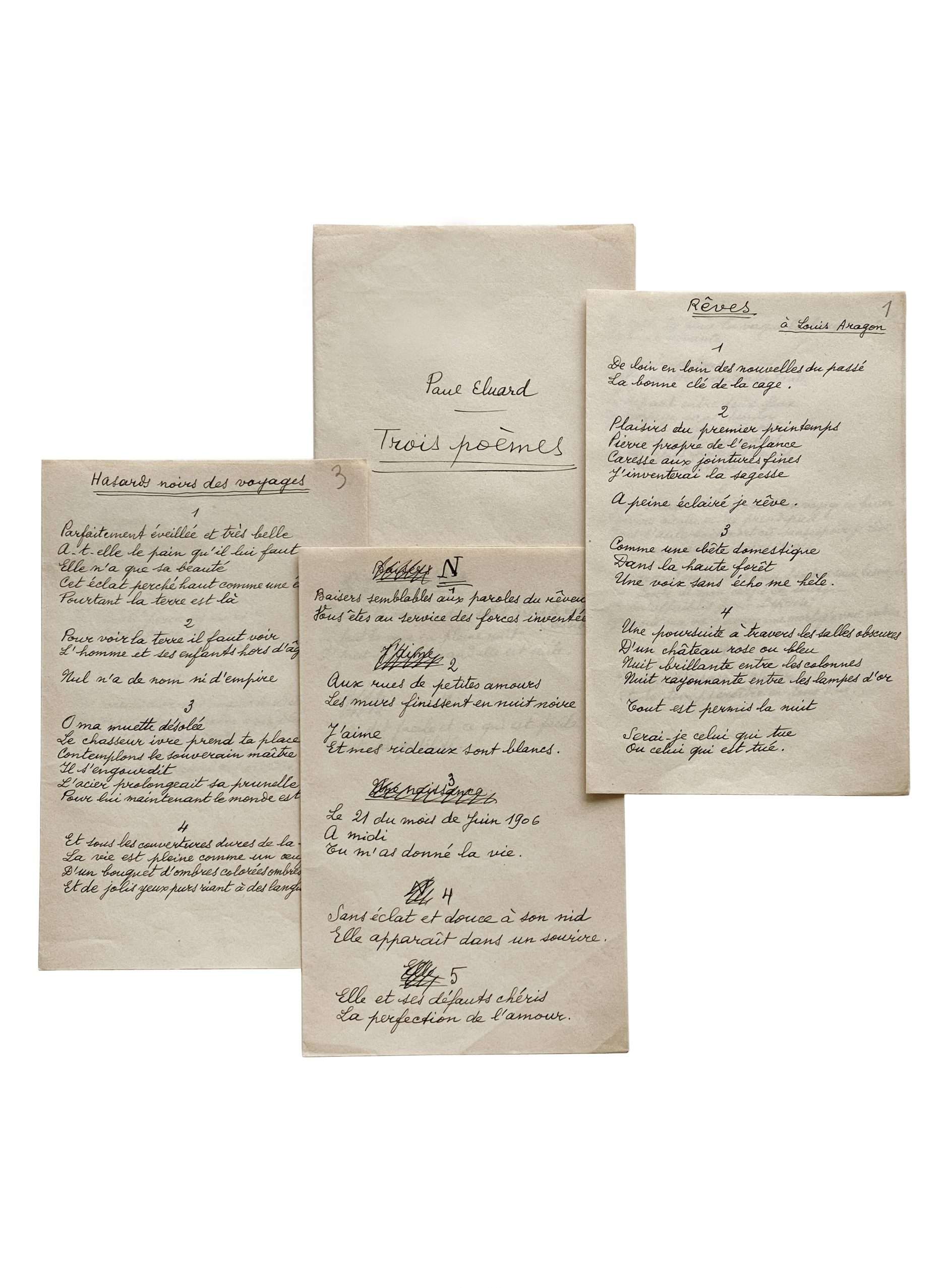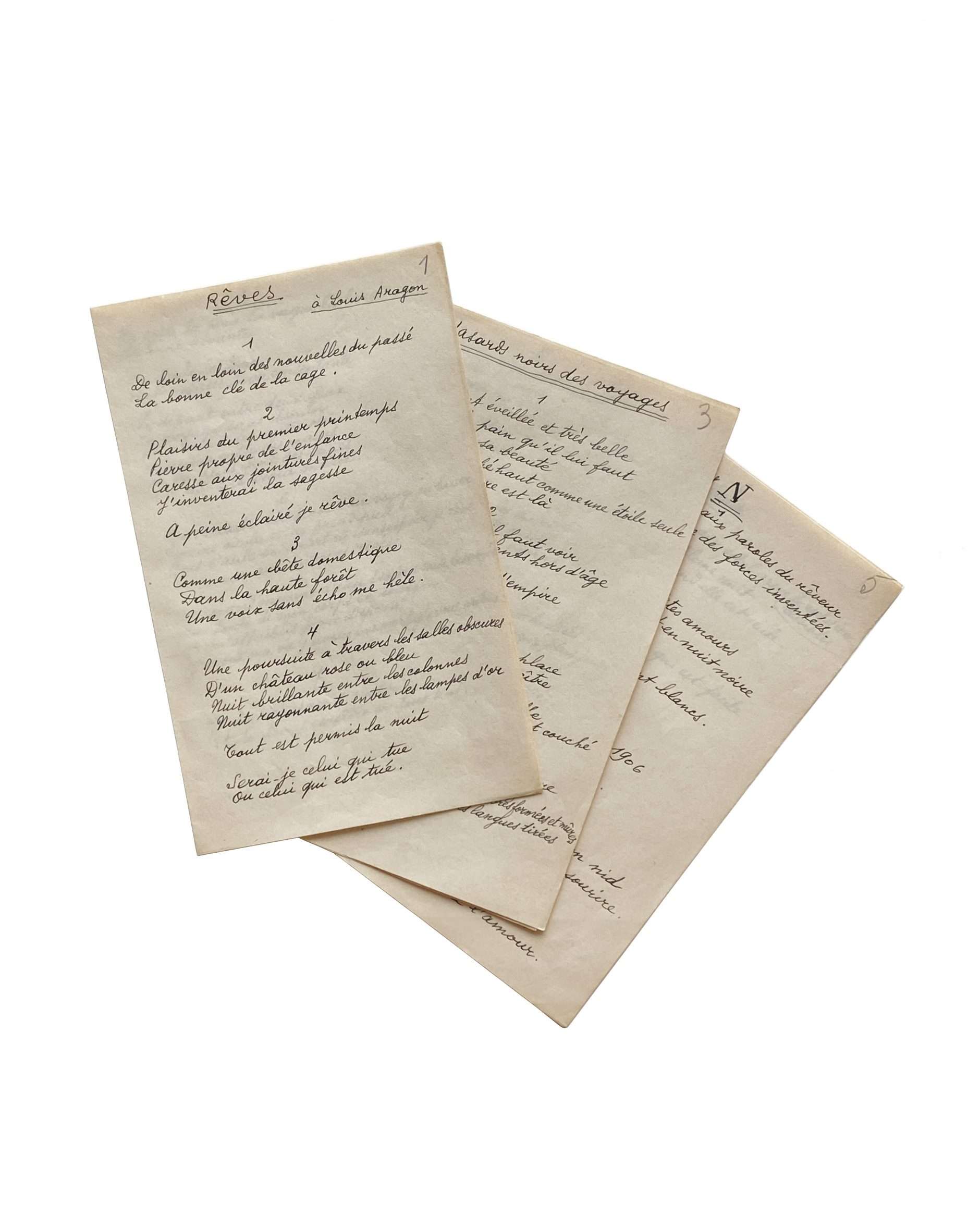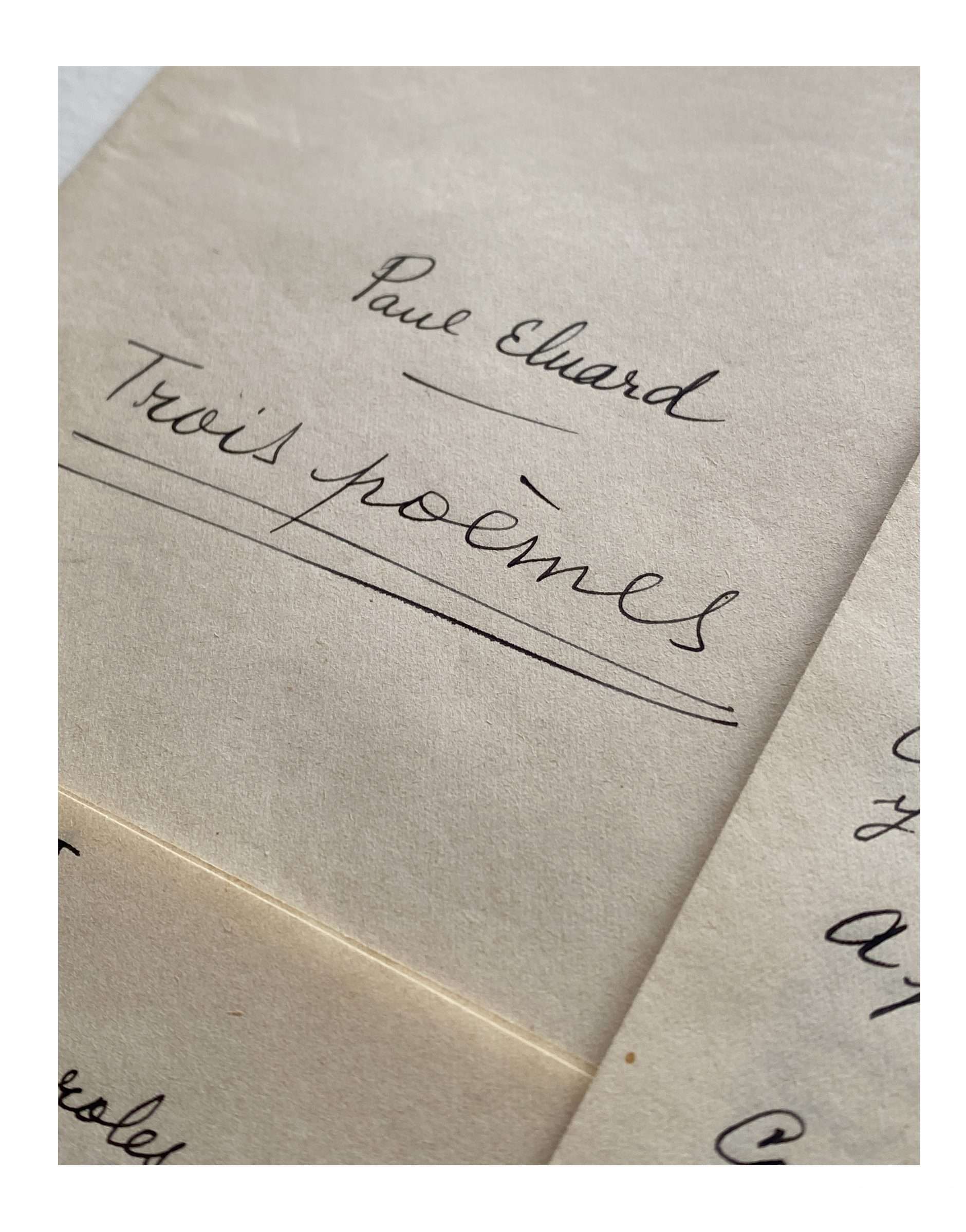ÉLUARD, Paul (1895-1952)
Autograph manuscript signed « Paul Eluard »
N.p.n.d [c. May 1943], 6 p. in-8°
« Will I be the one who kills / Or the one who is being killed »
Fact sheet
ÉLUARD, Paul (1895-1952)
Autograph manuscript signed « Paul Eluard », destined to Pierre Seghers
N.p.n.d [c. May 1943], 6 p. in-8° (including title page)
Fine condition
A precious series of poems, including the famous N., written for Poésie 43, then reprinted in the second edition of his world renowned collection Poésie et vérité 1942
This collection, entitled “Three Poems” by Éluard, was intended for Pierre Seghers, director of the journal Poésie. The poet soberly signed the manuscript of his name on the title page: Trois Poèmes. The chronology of the poems in the manuscript is such that it appears in the published collection. The pagination of each leaf, in multicoloured pencil, is also in Éluard’s hand.
The manuscript opens with Rêves (pages 1 and 2), the overarching title for the seven short poems it contains, some of which are in the form of a couplet or tercet. The series is dedicated to his friend Louis Aragon. Later that year, five of the seven poems appeared in the expanded edition of Poésie et vérité 1942. The dedication to Louis Aragon disappears and each of the poems is given a title, instead of their numbering. Finally, a very minor variation is to be observed between the two publications for the first couplet, En dépit de l’âge : « des nouvelles » become « les nouvelles ».
Rêves
à Louis Aragon
1 [En dépit de l’âge]
De loin en loin des nouvelles du passé
La bonne clé de la cage
2 [Plaisir du premier printemps]
Plaisirs du premier printemps
Pierre propre de l’enfance
Caresse aux jointures fines
J’inventerai la sagesse
A peine éclairé je rêve.
3 [Compagnon]
Comme une bête domestique
Dans la haute forêt
Une voix sans écho me hèle
4 [La Poursuite]
Une poursuite à travers les salles obscures
D’une château rose ou bleu
Nuit brillante entre les colonnes
Nuit rayonnante entre les lampes d’or
Tout est permis la nuit
Serai-je celui qui tue
Ou celui qui est tué.
5
La rosée la pluie la vague la barque
La reine servante
La perle de la terre
Perle refusée terre consentante
Le départ entre deux feux
Le voyage sans chemin
D’un oui à un autre oui
Le retour entre les mains
De la plus fine des reines
Que même le froid mûrit.
6
Bois meurtri bois perdu d’un voyage en hiver
Navire où la neige prend pied
Bois d’asile bois mort où sans espoir je rêve
De la mer aux miroirs crevés
Un grand moment d’eau froide a saisi les noyés
La foule de mon corps en souffre
Je m’affaiblis je me disperse
J’avoue ma vie j’avoue ma mort j’avoue autrui.
7 [Retraite]
Je sens l’espace s’abolir
Et le temps s’accroître en tous sens.
***
On pages 3 and 4: Hasards noirs des voyages is also made up of seven groups of verses. Unlike Rêves, Éluard did not assign titles to these groups for the expanded edition of Poésie et vérité 1942. There is also a variation between the two publications on the first quintil. Eluard decided to erase « notre azur plus jeune » and replace it with « le temps transparent ».
Hasards noirs des voyages
1
Parfaitement éveillée et très belle
A-t-elle le pain qu’il lui faut
Elle n’a que sa beauté
Cet éclat perché haut comme une étoile seule
Pourtant la terre est là
2
Pour voir la terre il faut voir
L’homme et ses enfants hors d’âge
Nul n’a de nom ni d’empire
3
O ma muette désolée
Le chasseur ivre prend ta place
Contemplons le souverain maître
Il s’engourdit
L’acier prolongeait sa prunelle
Pour lui maintenant le monde est couché
4
Et sous les couvertures dures de la terre
La vie est pleine comme un œuf
D’un bouquet d’ombres colorées ombres formées et mûres
Et de jolis yeux purs riant à des langues tirées
5
O ma sœur mon bel aimant
Je te garde le soleil
Le bel espoir du soleil
Je te réchaufferai
Je te désaltérerai
6
La clarté perce les murs
La clarté perce tes yeux
Tu vas voir et tu vivras
7
Nos caresses d’or nos vagues lustrées
Nos corps confondus notre azur plus jeune
Le temps transparent
Nos concevrons le bonheur
Dans le plus grand des miroirs
***
On pages 5 and 6, The famous N., one of his most emblematic texts, closes this series. This poem was written for Nusch, who was born on June 21, 1906 (see tercet 3). In collection 76, Le temps déborde, the poet will specify in a similar way the date of the “disaster” that turned his life upside down: “Twenty-eighth November one thousand nine hundred and forty-six”, the day of Nusch’s death (cf. Œuvres complètes, vol. II, Pléiade, p. 108).
Pierre Emmanuel, commenting on this declaration to the beloved, writes in Le Je universel chez Paul Éluard (GLM, 1948, p. 36) “that this spiritual birth (which, through the process of conquest over the past which we have shown is necessary for beings who love each other, is one with the carnal birth of the beloved) takes place at noon, to the highest day of summer, brings us back by one of those accidents of fate which are only the reverse of essential determinations of being, in the image of the universal I, of the sun which contains within it the totality of beings and things.”
The poem is presented here in its very first version, forming small groups of verses, in distichs or tercets, and always numbered from 1 to 7. Éluard, who had originally titled each of them, then redacted them and substituted them for numbers. One can imagine that the poet made this last-minute decision to give coherence to the entire series published in Poésie 43.
The couplet 5 [Elle] is not used in the second edition of Poésie et vérité 1942, replaced by the couplet « A quoi penses-tu / Je pense au premier baiser que je te donnerai », which is this time numbered 1. This same text was finally published the following year in Hommages, n°2 (Monaco), June 1944.
N.
Baisers 1
Baisers semblables aux paroles du rêveur
Vous êtes au service des forces inventées.
J’aime 2
Aux rues de petites amours
Les murs finissent en nuit noire
J’aime
Et mes rideaux sont blancs.
Une naissance 3
Le 21 du mois de juin 1906
A midi
Tu m’as donné la vie.
N 4
Sans éclat et douce à son nid
Elle apparaît dans un sourire.
Elle 5
Elle et ses défauts chéris
La perfection de l’amour.
Il faut la voir 6
Il faut la voir au dur soleil grevé de roches inaccessibles
Il faut la voir en pleine nuit
Il faut la voir quand elle est seule.
Facile 7
J’ai dit facile et ce qui est facile
C’est la fidélité.
We attach:
The first edition of Poésie 43, in which the set of poems appears
Provenance:
Pierre Seghers’s archives
Jacqueline Galy’s estate
Bibliography:
Poésie 43, mai-juin 1943, n°XIV, dir. Pierre Seghers, p. 6-10
Poésie et vérité 1942, seconde édition augmentée, Neuchatêl, éd. de la Baconnière, coll. des Cahiers du Rhône, 1943, p. 59, 77, 83-91
Hommages, n°2 (Monaco), juin 1944
Œuvres complètes, t. 1, éd. Marcelle Dumas et Lucien Scheler, Pléiade, p. 1115-1116, 1118-1122







